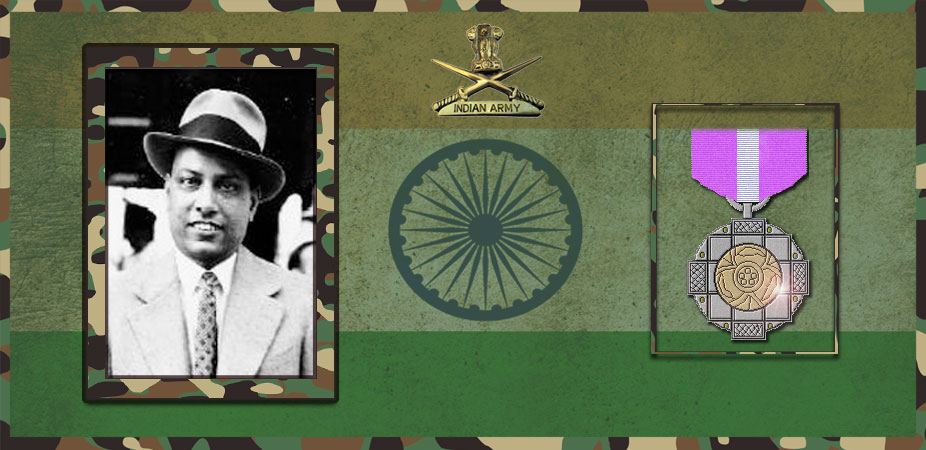Let's salute to our Indian Army together, We are proud to be Indian.
Let's salute to our Indian Army together, We are proud to be Indian.

Kasturbhai Lalbhai (19 December 1894 – 20 January 1980) was an Indian industrialist. He was widely perceived as a businessman akin to G. D. Birla. He co-founded the Arvind Mills along with his brothers and several other institutes.
He belongs to the family of Nagarsheth (city chief) of Ahmedabad, recognized by the Mughals, Marathas and the English during different times.
He was the descendant of Shantidas Jhaveri, a royal jeweler of Akbar. Khushalchand (1680–1748), the grandson of Shantidas paid ransom to the Marathas to save Ahmedabad from plunder in 1725. Khushalchand’s son Vakhatchand (1740–1814) was also a noted businessman. His grandfather Dalpatbhai Bhagubhai was also in cotton trading business in the 1870s. His father Lalbhai Dalpatbhai(1863–1912) established Saraspur cotton mill in 1896 addition to the traditional business of precious gems. It became a part of the swadeshi movement in India.
Kasturbhai was born to Mohini and Lalbhai Dalpatbhai, a Jain family, in 1894 in Jhaveriwad, Ahmedabad, Gujarat.
He studied at Municipal School Number Eight near Teen Darwaja, Ahmedabad up to fifth grade. He later joined Ranchhodlal Chhotalal Government High School. He matriculated in 1911 with second class. In 1912, when he was a 17-year-old studying in Gujarati College, his father died and being the second son, he was asked to discontinue his studies so as to help in the family business.His father Lalbhai had divided property among his brothers only in the recent past as his and his sons’ share, Lalbhai had received Raipur mills, a new establishment.
He was married to Sharda Chimanlal Jhaveri in May 1915 and had two sons, Shrenik and Siddharth.
He joined Raipur Mill as a chairman in 1912. The operations of the mill had not yet stabilized; hence, Kasturbhai had to take care of operations closely. He started off as a timekeeper in the mill, but fed up with the repetitive nature of the job, he started working with suppliers of the mill and traveled far and wide to understand the supplier market. The boom in demand during and post-World War I helped him in stabilizing the operations of the firm. He joined the board of directors of Raipur mill in 1918. Later he established Ashoka Mills in the 1920s with help of Dahyabhai Patel.He expanded business with help of the mentor and trusted general manager of all the textile mills Mr. Dahyabhai Motilal Patel who had the vision and insight to advise to invest in or acquire five mills between 1924 and 1938 including four belonging to relatives. These include establishment of Arvind Mills and Nutan Mills in 1931, Aruna Mills in 1928, Ahmedabad New Cotton Mills in 1938.Swadeshi movement by Mahatma Gandhi in the 1930s and starting of World War II in 1939 helped textile industry in India. He modernised all seven mills. They had 12% of India’s total spinning capacity and 24% of Ahmedabad’s total weaving capacity resulting in they were seventh largest cotton consumer in 1939 in India.
In 1948, his business group was named in the list of business houses indulging in black-marketing. R. K. Shanmukham Chetty, the finance minister and a friend of Kasturbhai had to resign for reportedly suggesting that its name be dropped from the list. The Income Tax department followed its allegations with a spate of inquiries and after almost ten years, absolved the group of any wrongdoing.
In 1952, his trusted advisor and general manage Dahyabhai Motilal Patel help strategise and start Atul Limited (literally, ‘incomparable’), India’s first modern dyestuff manufacturer, in collaboration with American Cyanamid Company. It was inaugurated by the first prime minister, Jawaharlal Nehru.
He was elected in Central Legislative Assembly in December 1923. During his three-year term, he was involved in lobbying for Indian industries including repeal of excise duty on textiles. During the 1930s, he came close with Mahatma Gandhi and helped him in Swadeshi movement which boycotted foreign goods and promoted local industries. He was also indulged in negotiation of taxes with British for Indian textiles during economic depression of the 1930s.
He held several important positions after independence of India, including Advisory Committee on Fundamental Rights, Minorities and the Administration of Tribal and Excluded Areas in 1947, chairmanship of the Economic Committee of the Ministry of Finance in 1948, chairmanship of Central Public Works Department Industry Committee in 1952, chairmanship of National Research Development Corporation, member of Council of Scientific and Industrial Research, trustee of Gandhi Smarak Nidhi, member of Indian Investment Centre. He also became the trustee and chairman of Mahatma Gandhi Memorial Fund. He also served as a member of Minorities Sub-committee as a representative of Jainism
With time, Kasturbhai started handing over the operations of his businesses to his family in the 1960s. He devoted more time to public activities. He retired from business in January 1977. He died on 20 January 1980 in Ahmedabad.